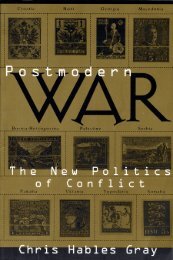6. Modern War - Chris Hables Gray
6. Modern War - Chris Hables Gray
6. Modern War - Chris Hables Gray
You also want an ePaper? Increase the reach of your titles
YUMPU automatically turns print PDFs into web optimized ePapers that Google loves.
<strong>Modern</strong> <strong>War</strong> [ 127 ]<br />
actually were. Doctrine was no longer a set of relatively simple rules that<br />
prescribed how men and weapons were to be maneuvered on the field of<br />
battle; it was, instead, a complex intellectual framework that enabled<br />
soldiers to conduct the intricate operations required in an arena that was<br />
increasingly dominated by the machines and techniques of modern industry.<br />
(1982, p. 212)<br />
So when the Great <strong>War</strong> came there was great confusion. Gen. Douglas<br />
Haig claimed that the machine gun would lead to the return of cavalry (Ellis,<br />
1973, p. 130). In the trenches the horrific effectiveness of machine guns led<br />
to a number of different reactions. Some soldiers even idolized the machine<br />
gunners of the enemy who killed so well.<br />
Among the machine gunners themselves a great dehumanization took<br />
place. Ellis quotes extensively from the experiences of one British officer, Lt.<br />
Col. G. S. Hutchison, who later wrote a history of the Machine Gun Corps.<br />
After most of his company was wiped out during the second battle of the<br />
Somme he got hold of a machine gun and caught a group of Germans<br />
silhouetted against the skyline. "I fired at them and watched them fall,<br />
chuckling with joy at the technical efficiency of the machine." Later in the<br />
battle he turned his gun upon a battery of German artillery "laughing loudly<br />
as I saw the loaders fall." Near the end of the war he helped crush the German<br />
offensive of 1918 and remembers machine gunning retreating Germans as<br />
"thrilling." On the same day he found a group of drunk stragglers from his<br />
own army. At machine gun point he forced them to attack the Germans.<br />
"They perished to the man" (pp. 144-145), he remarks cheerfully. What kind<br />
of man is this?<br />
Barbara Ehrenreich recognizes him as a war-man. She points out that<br />
many of the men who started World <strong>War</strong> II<br />
[did] not emerge on the plain of history fresh fromthe pre-Oedipal nursery<br />
of primal emotions, but from the First World <strong>War</strong>. That war was a<br />
devastating experience not only for the men who lost, like these, but for<br />
those who "won.''... In considering the so-far unending history made by<br />
men of the warrior caste, it may be helpful to recall that it is not only that<br />
men make wars, but that wars make men. For the warrior caste, war is not<br />
only death production, but a means of reproduction; each war deforms the<br />
human spirit and guarantees that the survivors—or some among them—<br />
will remain warriors. (1987, p. xvi; emphasis in original)<br />
As Ehrenreich says so well, World <strong>War</strong> I made the men who made World<br />
<strong>War</strong> II; so the one war certainly made the other, as wars have bred wars down<br />
through history. Still, World <strong>War</strong> II was unusual. It not only bred more wars,<br />
but it birthed a new type of war as well, postmodern war.








